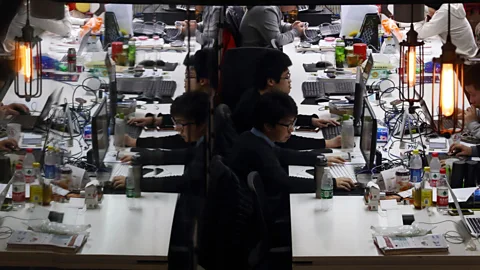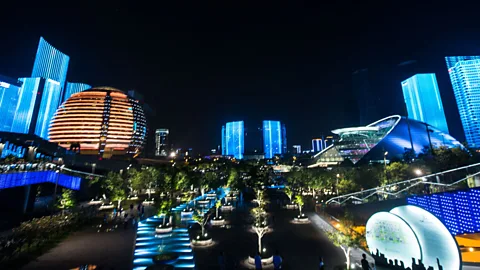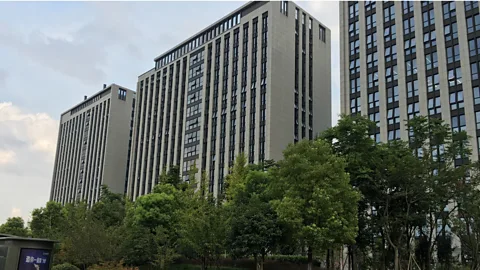Inside the high-pressure world of China’s start-up workers
 Tomohiro Ohsumi/Bloomberg/Getty Images
Tomohiro Ohsumi/Bloomberg/Getty ImagesMany Chinese start-up workers are putting in more hours than ever – even sleeping at the office. But does this mean they are more productive?
Andree Wu has only been an intern at Shanghai start-up Yitu Technology for a couple of months, but already feels at home.
The atmosphere is cozy, she says, with a piano for impromptu music breaks and a fridge stocked with drinks and snacks. Every day, there’s homemade soup prepared by the office cook – sometimes beef, sometimes green bean. And for the employees in the Research & Development department who have to work late, which is most nights, there’s a free “night snack” delivery at 10pm, along with a small loft with beds for snoozing.
 Getty Images
Getty ImagesWu, who works in the business and sales team, frequently logs long hours, from 9.30am to 9.30pm.On the day I visit her office, she was so sleepy after lunch, she retreated to the loft for a nap, her shoes set neatly beside each other on the stairs leading to the cubbyhole. But Wu isn’t complaining. This dedication comes with the territory at tech start-ups in China.
“Everyone wants to finish their work before leaving the office,” Wu says. “People work hard to create their own value. We have a lot of things to do but we don’t have that many employees, so everyone is wearing several hats.”
Long working hours are a way of life in China, no matter what the industry. According to one estimate by a researcher at Beijing Normal University, Chinese workers log an average of 2,000-2,200 working hours each year – far higher than their counterparts in the United States (1,790 hours per year), the Netherlands (1,419), Germany (1,371) and even Japan (1,719), according to OECD statistics.
And not everyone in China is happy about it. In one video that went viral this summer, an amateur Shanghai choir devoted a tongue-in-cheek song to their status as “overtime dogs” – a slang term for white-collar workers – entitled “My Body Is Hollowed Out.”
“Who needs sleep? What a waste of time!” they sing. “Who needs to eat when PowerPoint is my sustenance?”
The country’s brutal working hours have become such a concern, in fact, the government is starting to take notice. An editorial in 2012 in the state-run China Daily lamented that karoshi, the Japanese term for ‘death caused by overwork’, is now a reality in China, and that labour laws aren’t adequately protecting workers’ rights.
 Getty Images
Getty ImagesAnd a 2014 study of Chinese working hours suggested that the country’s work culture could even be holding it back as an international powerhouse. Lai Desheng, the dean of the business school at Beijing Normal University, said at a conference when the report was released that shorter working hours can not only improve productivity and the health of employees, but “will also help to accelerate the economic transition from ‘made in China’ to ‘made by China'.”
Competing on cost and speed
Rather than embrace this advice, however, Chinese start-ups, particularly those in the tech world, are getting workers to put in more hours than ever. Late-night meals are one thing, but some firms, like the cloud computing company BaishanCloud, have reportedly even installed bunks so workers can nap during the day or stay the night. Many start-ups take their cues from tech giants like Alibaba, where employees pitch tents to sleep on the grounds in the run-up to the biggest online shopping day of the year; and Huawei, which became known in its early days for its so-called “mattress culture,” a term used to describe the thin mattresses that engineers kept under their desks for when they had to work late.
It certainly doesn’t help that enormous sums of venture capital money are still pouring into China despite concerns over the country’s slowing economy – a record $37 billion in 2015, according to Bloomberg, double the previous year – making competition in the tech world fierce.
The workplace culture in China’s start-up scene is even more demanding than in Silicon Valley, says Gary Rieschel, the US co-founder of Qiming Venture Partners, which has backed smartphone maker Xiaomi.
 Justin Bergman
Justin BergmanOne reason for this, he says, is that for many tech start-ups in China, their business models are not based on a unique idea, but one derived from somewhere else, either another start-up in China or one in the US. This leaves them only two ways to compete—on cost and speed. “And when you’re competing on low cost and speed, there’s really only one culture to be successful, and that’s a 24-7, 365 (day) culture.”
Ken Xu, a partner at Shanghai-based venture firm Gobi Partners, says that for many young tech workers, there’s also no semblance of work-life balance: the job is their life. Many relocate to cities where they don’t have family or friends so they’d rather stay late at the office to make extra money and socialise with colleagues during long meal breaks. And start-ups with a little cash can provide home comforts such as speedy wi-fi, video games and free meals.
“They can take a short break to play games, take a break to talk to other guys,” Xu says. “When they go home, they’d do the same thing – play games and watch videos.
“It’s not about working, this is part of their lifestyle. They don’t want to go home, they just want to stay there.”
The Silicon Valley style
Yitu Technology, which specialises in computer vision, developing highly advanced technology that can recognize faces and cars from images in real time, has taken pains to get this comfy office part just right. Co-founder Leo Zhu spent a decade studying and working in the US, earning a doctorate at UCLA and a post-doctoral fellowship at MIT. When he returned to China to start his company, he sought to bring some US start-up culture with him.
Working hours are long, yes, but he says they’re flexible – employees can take long lunches and dinners and those with families can come in early so they can leave the office by 8pm. The lounge has a Foosball table and Xbox—popular with both men and women—and on Saturdays, there are breaks for organised basketball games.
In the office itself, there are special ergonomic chairs with headrests, handpicked by Zhu himself at 3,000 renminbi (US$450) apiece. The dress is casual – T-shirts, shorts and tennis shoes. And once a week, the company also hosts popular TED-style seminars on topics related to new computer technologies and theories.
 Tomohiro Ohsumi/Bloomberg/Getty Images
Tomohiro Ohsumi/Bloomberg/Getty ImagesAt Yitu, long hours are a given, usually 11-hour days, minus breaks for lunch and dinner, so Zhu has tried to create an office culture that’s at least stimulating and engaging. “Young people here, I think they care more about growth. They want to learn something, not just finish a task,” he says.
Trust issues?
There are obvious downsides to living in the office. Take productivity, for instance. Rieschel says there’s a tendency at many Chinese start-ups for workers to put in face time – staying late just to be seen staying late, similar to what happened at many Japanese companies in the 1980s and ‘90s. “Is it really necessary for people to be there that length of time, day in and day out?” he asks. “There’s not a lot of trust in Chinese society, so if you can’t be seen, then well what are you doing?”
Fatigue is another issue. Are employees at start-ups at their most efficient when they’re sleep-deprived? And how does this impact another key factor for start-up success – innovation?
Shen Aixiang, the 24-year-old founder of an online camping services provider called Eluying (“E-Camping” in English), is well aware of these risks. But he added that successful tech start-ups must find the right balance because he believes fewer working hours are just not an option.
His company has seen rapid growth since launch two years ago, receiving its third round of funding this summer to the tune of 20 million renminbi (US$3 million). He’s also grown to 60 employees – all of whom are under the age of 30. Most work until 9 pm each night, six days a week, but it hasn’t had a negative impact on performance, Shen says.
“Actually, I don’t encourage employees to sleep in the office because I think better sleep, especially in their home, can bring better quality of work,” he says in Eluying’s bright, open-plan office in the new start-up hub of Hangzhou, not far from Alibaba’s sprawling headquarters. But he adds, “most start-up companies in China don’t need that much creativity. What they need most is execution ability… it’s more important to recruit more employees to execute, and leave the creativity for management level.”
Like Zhu, Yitu’s founder, Shen believes the key to motivating the highly educated and independent-thinking members of China’s post-90s generation is through other means – more ownership in the company (even his lowest-level employees are offered this) and a work culture they can believe in.
Young people in China today don’t care as much as previous generations about joining a big, established company where they’re jobs are stable but their impact might be marginal, he explains. They’re more drawn to the thrill of a start-up, building something from scratch.
And, for that, an 60- to 70-hour work week might be the biggest trade-off.
